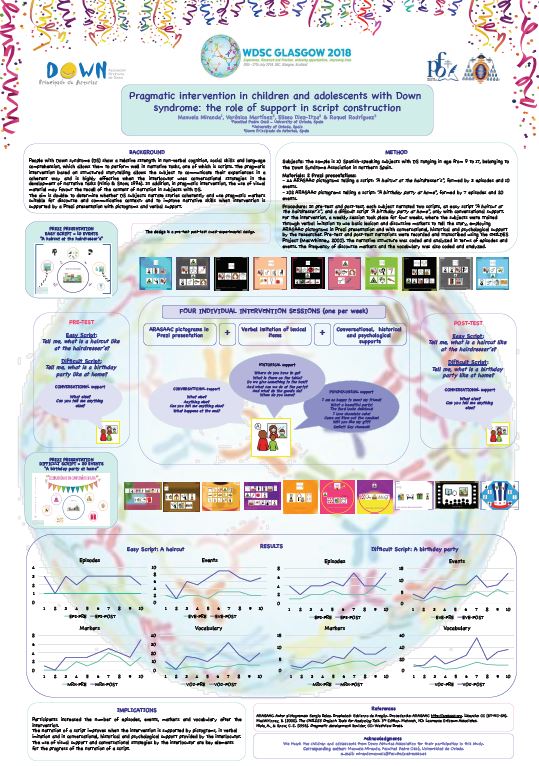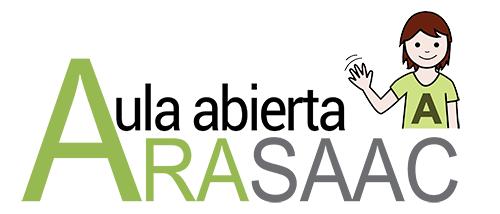Authors
Manuela Miranda
Verónica Martínez
Eliseo Diez-Itza
Oviedo University
Raquel Rodríguez
Poster presented at the World Congress of Down Syndrome,
WDSC 2018 Glasgow, United Kingdom, 25-27 July 2018.
___________________________________________________________________
Summary “Pragmatic intervention in children and adolescents with Down syndrome: the role of supports in the construction of scripts”
People with Down syndrome (DS) show relative strength in nonverbal cognition, social skills, and language comprehension, which allows them to perform well on narrative tasks. Pragmatic intervention based on structured narratives allows the subject to communicate experiences coherently and is highly effective when using visual supports.
The objective is twofold: to determine whether subjects with DS tell stories coherently and use pragmatic markers appropriate to the demands of the discourse and communicative context; and improve narrative skills when the intervention is supported by a Prezi presentation with pictograms and verbal support.
The design is quasi-experimental pretest postest. The sample consists of 10 subjects with DS between 9 and 17 years belonging to the Down Syndrome Association of northern Spain.
In the pretest and posttest each subject had two scripts of different difficulty, only with conversational support. A weekly intervention session was held for four weeks in which they were trained to use, through verbal imitation, the basic lexical and discursive elements to tell the story, using ARASAAC pictograms presented in Prezi support and with the conversational, historical and psychological supports of the researcher. The pretest and posttest narratives were recorded and transcribed using the CHILDES Project (MacWhinney, 2000). The narrative structure in terms of events and episodes, and the frequency of discursive markers were codified and analyzed.
The results show an improvement in coherence, history recall and markers after the intervention. It is concluded that this type of intervention reflects the importance of visual support, verbal imitation and interlocutor supports in linguistic development at the pragmatic, lexical and grammatical level in DS.
Abstract “ Pragmatic intervention in children and adolescents with Down syndrome: The role of support in script construction”
Persons with Down Syndrome (DS) show a relative strength in non-verbal cognition, social abilities and language comprehension, which enable them a good performance in narrative tasks. Pragmatic intervention based on structured narratives allow the subject to communicate their experiences in a coherent way and it is highly effective when visual support is used. The aim is double: to determine whether DS subjects narrate stories coherently and use pragmatic markers suitable for discourse and communicative context; and improve narrative abilities when intervention is supported by a Prezi presentation with pictograms and verbal support. Design: It is a pre-test post-test experimental design with control group. Methods: The sample is 20 subjects, ten with DS ranging in age from 6 to 16, belonging to the Down Syndrome Association northern Spain, matched with ten 5-year-old typical development subjects in mean length utterance (MLU). In pre-test and post-test, each subjects narrated two scripts of different difficulty, only with conversational support. A weekly session took place for four weeks, where the subjects were trained through verbal imitation to use basic lexical and discursive items to tell the story, employing ARASAAC pictograms in Prezi presentation and with conversational, historical and psychological support of the researcher. Pre-test and post-test narrations were recorded and transcribed using the CHILDES Project (MacWhinney, 2000). The narrative structure was coded and analyzed in terms of events and episodes. The frequency of discourse markers was also coded and analyzed. The data was analyzed with statistical program SPSS. Results: The subjects show an improvement in coherence, recall of the story, markers, MLU, Types and Tokens. Implications: This type of intervention show the importance of imitation and visual support in linguistic development at a pragmatic, lexical and grammatical levels in DS.
Download the poster in pdf












